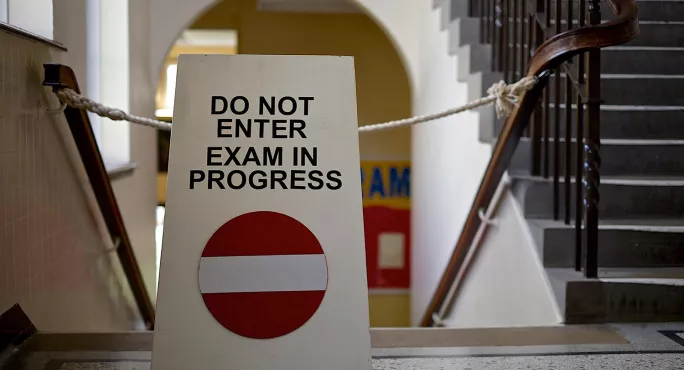
- Home
- Student take: Why GCSEs shouldn’t be scrapped
Student take: Why GCSEs shouldn’t be scrapped

Earlier this month, chairman of the Commons Education Select Committee Robert Halfon called for GCSEs to be scrapped and replaced with a “baccalaureate” qualification to combat the skills deficit we now face. He argued that education is too focused on rote learning because of performance measures such as the EBacc and should be changed to recognise academic and technical skills alongside personal development.
Many others have since vocalised their support for this idea, including Lord Baker who originally helped introduce GCSEs in 1989 but has now called the exams "redundant”.
The proposal has proved unpopular with young people. Sixty-two per cent of students said they’d rather keep them than scrap them, according to the Student Room.
I took my GCSE exams last summer and I feel that scrapping the exams would only increase inequality in education.
Increasing the focus on vocational skills would mean that by the age of 16, students would need to have a clear idea of what they want to do in the future, rather than gaining a wide range of qualifications that allows them to decide as they go.
This would both increase and legitimise the class gap in educational achievement. Working class pupils would be encouraged into less highly regarded vocational courses, helping to decide their future social position before they had even finished education.
By contrast, middle class pupils, already better equipped to gain access to top professions, would be filtered into esteemed vocational courses furthering their advantage in education.
Those who choose to leave school at 16 would also suffer. It would be virtually impossible to go into apprenticeships or payed employment without exam results to apply with, meaning people would have to remain in standard education up to 18.
This contradicts Halfon’s view that the changes would stop secondary school from being a narrow academic pathway. The baccalaureate option may not suit all students.
The exams are aren’t perfect or completely objective, they offer a fairer system of the two ideas. Everyone takes the same exams, the same subjects and content and all the exams are marked the same way with little potential for unfair discrimination.
Sitting my GCSEs was a stressful experience, but they did help me to discover what I wanted to do later in life. I was able to identify what I enjoyed, what I was good at and what I definitely didn’t want to do any more of.
Rather than scrapping the system altogether, it should be redeveloped. There’s four things that I think should be changed:
-
Exam anxiety
A lot of people taking GCSEs think their school cares more about their exam results than their wellbeing and do little to reduce the anxiety sitting exams brings about. In my experience, the teachers did try to tackle the problem of exam stress but their efforts were countered by the inevitably intense pressure around achieving top grades. -
Consistent grading system
The change from lettered to numbered grades properly came into effect last year, when I took my GCSEs, and included most subjects. However, there were still a few subjects that maintained the lettered grading system which was not only confusing but also made some subjects, especially languages, very unfair. For example: I took Italian GCSE and my friend Emily took French. French GCSE had transitioned but Italian had not. I was allowed to take a dictionary into the exam with me and was told the questions for my oral exams beforehand. Emily wasn’t given the same advantages in French. -
Choice over which paper you take
Students should be able to choose for themselves whether they take foundation or higher papers. If a student feels able to pass the foundation paper but not the higher, be allowed to opt for the foundation paper would be they’re more confident and less likely to fail. This not only looks better for the student and their overall point score but also the school because they would end up having higher pass rates. -
Application over content
Exams should focus less on content than application of knowledge. I found that many of my exams tested your memory rather than ability or understanding of a given subject. In English literature, a large chunk of my revision was learning quotes. In my opinion, you should be allowed to bring an unannotated text into the exam because it should test your knowledge of a text, not your ability to memorise quotes. The increased focus on memory in exams, I feel, means that as long as you have a good memory, achieving high grades is fairly easy and less so if you don’t.
These changes would help to make GCSEs less of a stressful experience overall and give everyone more of a chance to get the results they deserve.
Jaya Plant is an A-level student at Thomas Tallis School, Blackheath. She took her GCSEs at a different secondary
Register with Tes and you can read five free articles every month, plus you'll have access to our range of award-winning newsletters.
Keep reading for just £4.90 per month
You've reached your limit of free articles this month. Subscribe for £4.90 per month for three months and get:
- Unlimited access to all Tes magazine content
- Exclusive subscriber-only stories
- Award-winning email newsletters
You've reached your limit of free articles this month. Subscribe for £4.90 per month for three months and get:
- Unlimited access to all Tes magazine content
- Exclusive subscriber-only stories
- Award-winning email newsletters
